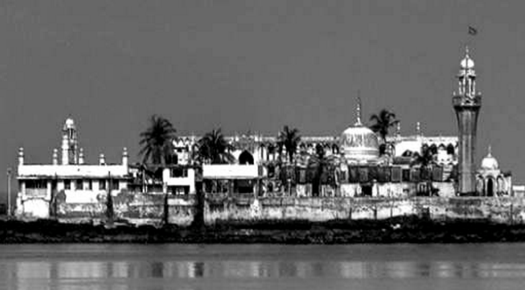
The Haji Ali mosque in the Indian city of Mumbai has been facing pressure to retract a ban on women visiting its innermost sanctum, a change that could set an example against gender discrimination at places of worship. Bharatiya Muslim Mahila Andolan (BMMA), a Muslim-led women’s rights group has been locked in the legal broil with trustees of the mosque, which was built in the 15th century and is popular not only among Muslim devotees but Hindus and tourists of other religious denominations as well.
Located on an islet accessible via a causeway during low tide, the mosque was built in memory of a wealthy Muslim man, who gave up all his worldly possessions to pursue a pilgrimage to the holy city of Mecca. According to folklore, Pir Haji Ali Shah Bukhari, who was also a revered Sufi saint, died during this journey with his body being washed up on rocks in the Arabian Sea. His followers then constructed the mosque, placing his tomb in the innermost sanctum. This is only one of the many mosques and temples in India that restricts access to women on grounds of gender discrimination.
Reportedly, women have been prevented from entering the mosque’s mausoleum since 2011, when trustees decided that close proximity of a female to the tomb of a revered saint could qualify as a grievous sin in Islam. With regards to this, BMMA wrote a petition to Bombay High Court, stressing that the ban is unconstitutional and overturning it would serve as a major step forward for women’s rights in India.
“A positive ruling would set a precedent and would have a wider and long-term effect,” BMMA co-founder Noorjehan Niaz said. “It would send a message and encourage women of all religions who are barred from entering places of worship to approach courts with similar demands.”
Haji Ali is one of Mumbai’s most recognizable landmarks, receiving tens of thousands of visitors each week. Niaz clarified that even though women were banned from entering the mausoleum four years ago, they can still visit other areas inside the mosque and offer prayers as well. Apparently, the mosque’s trustees cited menstruation as the reason for refusing access to women.
“They've said women are impure. But menstruation is a natural event and responsible for the entire of humanity being born. How can it be dirty? It's a ridiculous and demeaning argument,” she said.
Niaz first complained to the mosque’s board and then sought help from Maharashtra’s minorities commission before finally taking legal action last year.
“The shrine is symbolic for people of all castes, all religions and countries. It's an iconic place and people travel from all over the world to visit it. … How can you bar somebody from entering the sanctum just because she is a woman? The decision was anti-women and anti-Islamic and we had no option but to go to court. It was the last resort,” Niaz said.
Maulana Mustaqeem Azmi, a member of the nonprofit All India Muslim Personal Law Board, said that the rule was the same as those in other mosques.
“To insist that they be allowed into the tomb is against the religion,” he said.
Even though human rights lawyers have been backing the demands of these Muslim women, they are skeptical of whether their case will actually win at court. So, they are pushing for a law that makes it illegal for any trust to bar entry to a public place of worship on grounds of gender discrimination.
“There are lots of temples where women are not allowed. If you go through each individual case it will be an endless exercise so you have to have state intervention,” said a prominent lawyer, Mihir Desai. “Courts also like to restrain themselves from ruling on religious issues. Whether the court will deliver a verdict in favour of the women is very doubtful.”
Photo Credits: India Wires
